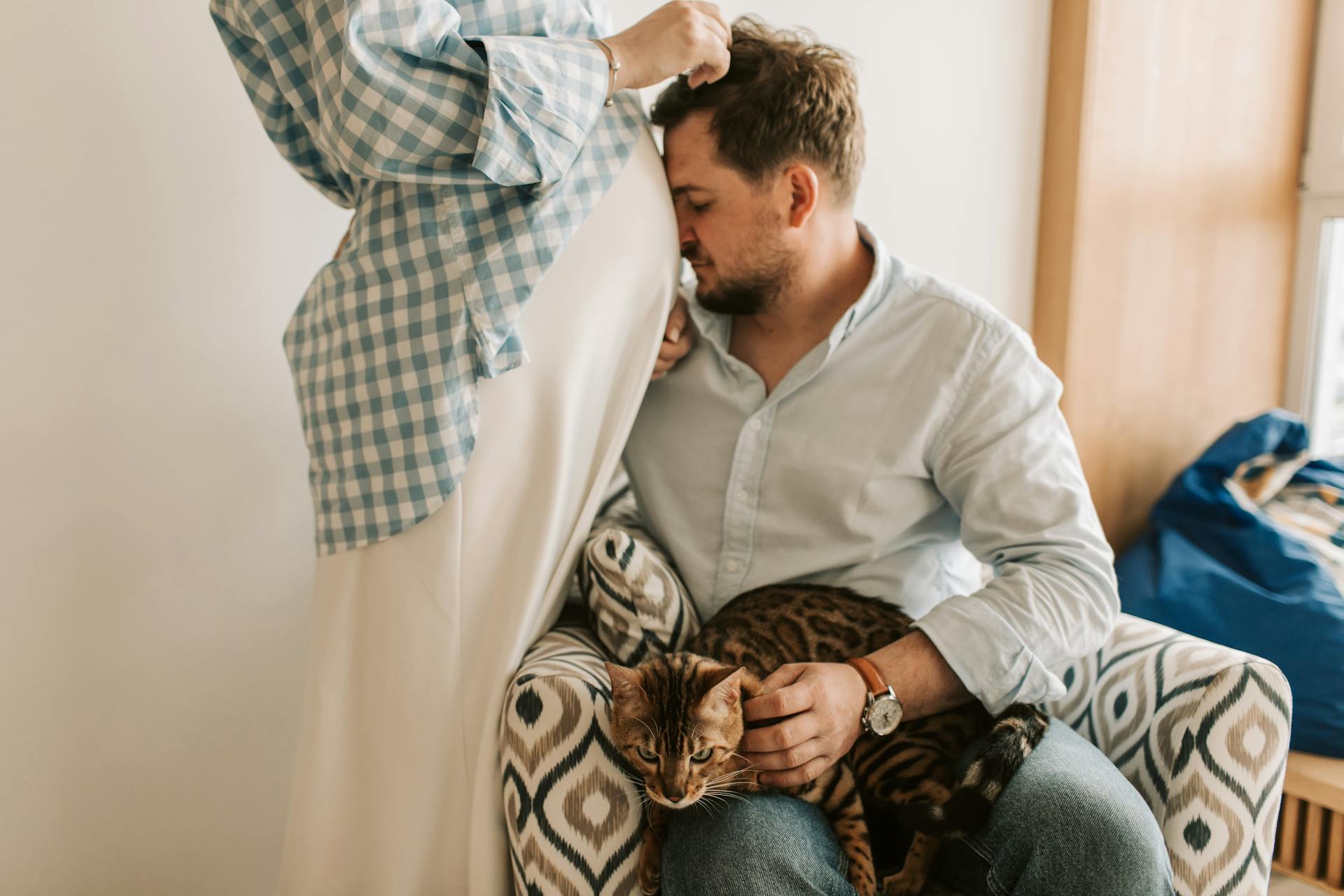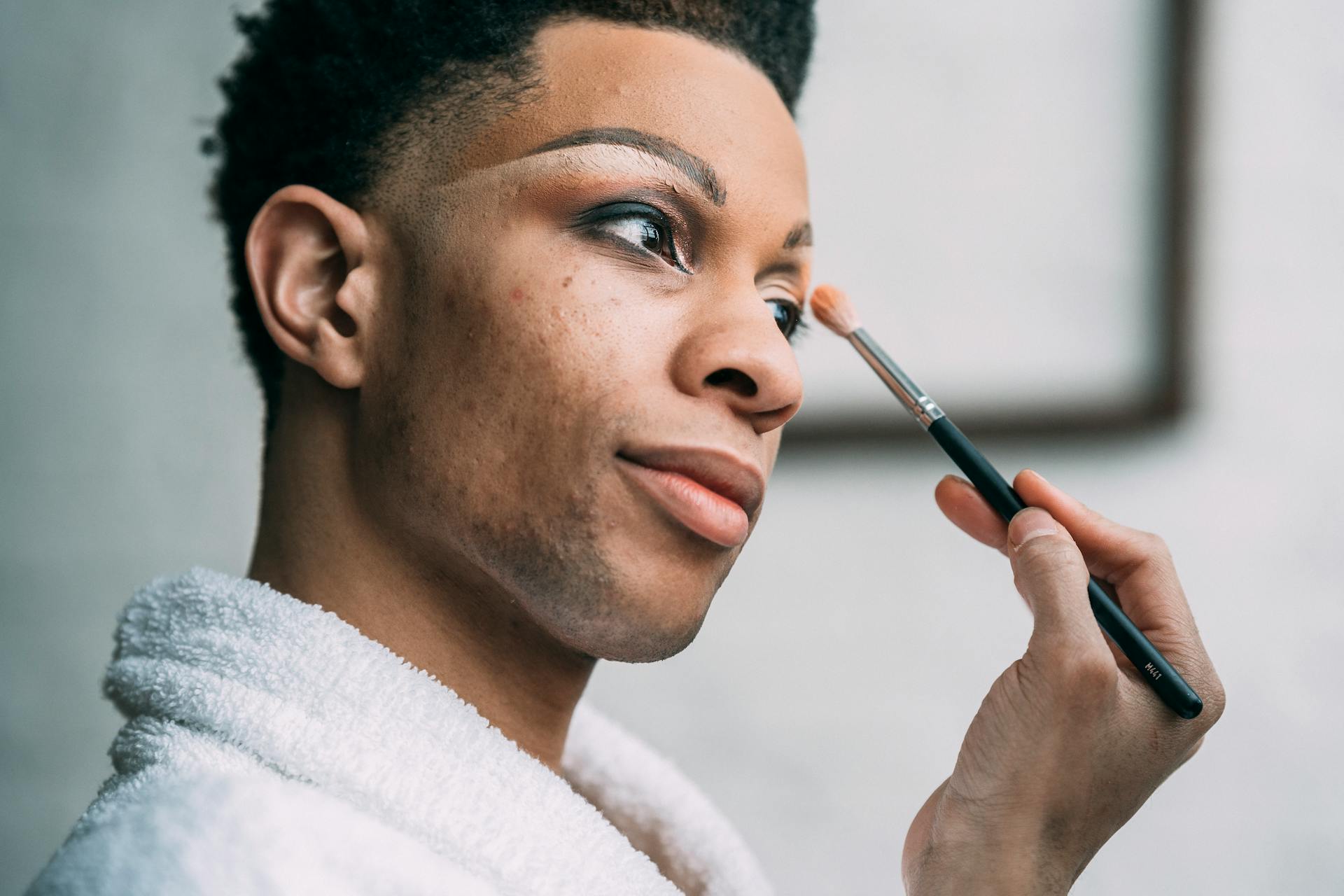
Cats are known for their independence and self-sufficiency, but when it comes to cat pregnancy and kittens, there are some important things every pet owner should know. If you have a pregnant cat or are considering breeding your feline friend, understanding cat pregnancy signs, pre-partum care, and postpartum care is crucial for the safety and well-being of both the mother and her newborn kittens.
During cats pregnancy, cats tend to become more hungry and may need extra snacks throughout the day. It's also important to make sure your pregnant cat is comfortable and has a safe space to give birth including specific section designated for her. While cats are pretty self-sufficient creatures, caring for a pregnant cat requires some attention and safety considerations. From ensuring the mother is comfortable during labor to providing proper kitten care after giving birth, there are many things that need to be taken into account.
Explore further: Cockapoo Pregnancy
Understanding Cat Pregnancy: Signs to Look Out For

If you suspect that your cat may be pregnant, there are several signs to look out for. The most definitive ways to confirm pregnancy include a blood test, ultrasound, or x-rays. However, if you're unable to get your cat to the vet, there are still a few things you can look for at home.
Abdominal palpation is typically referred to as the method of feeling your cats' abdomen for any changes or growths. Additionally, queens' behavior and physical appearance will greatly change during pregnancy, and they may even exhibit symptoms of false pregnancy due to hormonal imbalances. Keep in mind that these changes can also occur in non-pregnant queens.
It's essential to monitor your cat's behavior and health throughout her pregnancy carefully. If you notice any concerning signs or symptoms, it's best to bring her into the vet immediately. By understanding the signs of cat pregnancy and being vigilant about your pet's health, you can help ensure that she has a happy and healthy litter!
Related reading: Why Doesn't My Cat Look at Me?
The Waiting Game: Understanding Cat Labor Duration
Cat labor can be a confusing and stressful time for cat owners. Understanding the duration of cat labor is crucial to ensure that your pet receives proper care and attention. Generally, cat labor lasts between 24-36 hours from the time contractions occur.
Contractions occur when the kittens are ready to be born, and they usually last for about 10 minutes every hour or two. The first stage of cat labor may last up to 6 hours, during which contractions become more frequent and intense. In the second stage, each kitten is born within 1-2 hours after pushing begins.
It's important to keep an eye on your pregnant cat during labor to ensure that everything goes smoothly. If you notice any signs of distress or if it has been more than 2 hours since your cat began pushing without any progress, contact your veterinarian immediately. Understanding the duration of cat labor can help you prepare for the arrival of your furry bundles of joy!
The Fascinating Journey of Cat Pregnancy: A Peek Inside.
The journey of cat pregnancy is a fascinating one that takes us inside the world of feline reproduction. The cat gestation period, or cat pregnancy length, lasts about 63-65 days from conception to delivery. During this time, the mother cat undergoes several changes in her body as she prepares for the arrival of her kittens. From morning sickness to nesting behaviors, there's so much to learn about the amazing journey of cat pregnancy.
You might enjoy: Chiweenie Pregnancy
Understanding When Cats Can Begin Mating and Reproducing

When it comes to cat pregnancy, it's important to understand when cats can begin mating and reproducing. Generally, female cats can start reproducing as early as 4 months old, while male cats may start a bit later. However, it's important to consider spaying or neutering your cat if you don't plan on breeding them. This can prevent unwanted litters and health issues down the line.
A unique perspective: What Does a Cat Do When It Loses Its Tail?
Ways to Determine if Your Feline is Expecting a Litter
If you are an owner of an adult cat and have been wondering if your feline friend is pregnant, it's important to know the signs. A cat's pregnancy can last anywhere between 65 to 75 days, which is about nine weeks. One way to tell if your cat is expecting a litter is by observing changes in her behavior.
Cats usually go into a special condition called heat multiple times during their prime months, so it's important to watch out for the right time frame. This may happen every two to three weeks for about ten days each time. During this period, you may notice your cat being more vocal and affectionate and even rubbing herself against furniture or other objects.
Another indication that your cat might be pregnant is a rising temperature. Normal cat body temperature ranges between 100.5°F and 102.5°F, but when they are pregnant, it can rise by half a degree or more within the first few weeks of gestation. If you suspect that your cat might be pregnant, it's best to take her to the vet as soon as possible for a proper diagnosis and care plan.
You might enjoy: What Temperature Is Too Hot for Cats?
Feline Nutrition: Proper Diet for Your Pregnant Cat
Proper nutrition is essential for pregnant cats to ensure a healthy pregnancy and delivery. Pregnant cats need a diet that is high in protein and calories to support the growth of their kittens. It's important to feed them small, frequent meals throughout the day and provide fresh water at all times. Avoid feeding your pregnant cat raw or undercooked meat, as well as foods that are high in magnesium, as these can be harmful to her and her kittens. A balanced diet will help ensure that your pregnant cat delivers healthy kittens and stays healthy herself.
Check this out: How Many Kittens Can a Cat Have at One Time?
1. Feed a High-Calorie Cat Food
If you have pregnant cats or gestation queens, it's important to feed them a higher-calorie diet. Look for commercial diets labeled as "pregnancy" or "kitten" formulas that provide the extra energy and nutrients needed during this time. These higher-calorie cat foods will help ensure a healthy pregnancy and delivery for your furry friend.
Consider reading: Boston Terrier Pregnancy
2. Provide Frequent Meals
During cat pregnancy, it's essential to provide frequent meals to lactating cats. Growing fetuses and birthing kittens place a higher metabolic demand on cats, requiring them to eat smaller, more frequent meals throughout the day. Feeding kittens also increases the need for sufficient nutrition in their mother's diet, making it crucial to ensure that they're getting enough food to meet their needs. By providing frequent meals, you can help support the health of both the mother and her offspring, giving them the best possible start in life.
Engage in the Conversation: Share Your Thoughts
Have you ever witnessed a cat pregnancy? Did you know that cats can become pregnant as early as four months old? We want to hear your thoughts and experiences on cat pregnancy in the comments section below.
Don't forget to leave your email address so we can notify you when new articles are published. Required fields are marked with an asterisk, but feel free to share as much or as little information about yourself as you like. We appreciate all of our readers' engagement in the conversation!
We love hearing from our readers and value your feedback. Are there any topics related to cat health that you would like us to cover in future articles? Let us know in the comments section below or send us an email at [insert email address]. Thank you for being a part of our community!
Understanding the Phases of Your Cat's Birthing Process
Understanding the Phases of Your Cat's Birthing Process is crucial for any cat owner. The first phase is the preparatory phase, during which the cat will become restless and start nesting. This is followed by the main stage, where the actual delivery takes place, and kittens are born every 30 to 60 minutes. Lastly, there's the final phase where the placenta is delivered, and the cat starts nursing her litter. Knowing what to expect at each stage can help you provide better care for your cat and her newborns, ensuring a smooth birthing process for all involved.
1. First Stage of Labor: Contractions and Restlessness
During the first stage of labor, cats may experience cervix relaxation and intermittent contractions for 12-36 hours before full contractions occur. They may also act restless and seek out a nesting box to prepare for the birthing process. Monitoring their body temperature can also be helpful during this stage.
2. Third Stage of Labor: Afterbirth
The third stage of labor in cat pregnancy is when the afterbirth, also called fetal membranes or greenish-black mass, is expelled from the mother. It's important to monitor this process closely and make sure the entire afterbirth is passed. If a retained placenta occurs, it can lead to fever, infection, lack of appetite, and overly bloody or abnormal vaginal discharge. If the mother cat fails to pass the afterbirth within a few hours or shows any concerning symptoms, seek veterinary care immediately.
When your cat is giving birth
When your cat is giving birth, it's important to provide a comfortable and calm environment for her. Make sure she has access to a private area and plenty of clean bedding. Keep an eye on her progress, but try not to interfere too much as cats are instinctively equipped to handle the process themselves. If you notice any signs of distress or difficulty during labor, contact your veterinarian immediately for assistance.
Knowing the Right Time to Offer Your Feline Friend Help
As a cat owner, it's important to know when your feline friend needs your help during pregnancy. Once the mother cat goes into labor, you need to be ready to offer assistance. When kittens start tearing out of the amniotic membrane, the mother cat licks them clean and stimulates their breathing.
If this doesn't happen or if a kitten is not breathing, you can gently rub the kitten with a towel to make sure it starts breathing. You can also carefully cut the umbilical cord with non-waxed dental floss or sturdy thread tightly wrapped around it and tied close to the kittens' body.
If the mother cat chews off the cord but doesn't tie it properly, you can also use a sharp pair of scissors or nail clippers but be very careful not to hurt the kitten. Knowing when and how to offer help during cat pregnancy is crucial for both mother and kittens' health and wellbeing.
Creating a Relaxing Environment for Your Cat During Birth
Pregnant cats need a quiet area to give birth, so it is a good idea to create one in advance. A nesting box is a great option, and you can make one using a large cardboard box with low sides making it easy for your cat to access. Simply put soft, clean bedding inside the box to provide warmth and comfort for your pregnant queen.
To make your cat feel comfortable during birth, keep their nesting area private and away from noise and disturbance. Make sure they have access to food, water nearby, and a litter box that is easily accessible without having to leave the nesting area. This will help reduce stress levels for both you and your cat.
Lastly, remember that creating a relaxing environment during birth is essential for both the mother and her kittens' well-being. By providing a quiet part of your home with all the necessary amenities close by, you can ensure that your pregnant cat feels safe while giving birth. With these tips in mind, you can help make this special time less stressful for everyone involved!
Essential Information for Taking Care of a Feline Mom-to-be

Cat pregnancy is an exciting time for pet owners, but it requires careful preparation and attention to ensure a successful birthing process. First and foremost, ensure that the cat is eating high-quality food formulated for cats' pregnancy. Avoid overfeeding as excessive weight gain can lead to complications. Instead, provide frequent small meals throughout the day.
Create a nesting place fill with clean sheets, such as a cardboard box or laundry basket in a safe quiet area. Place a heating pad under half of the nesting area, so the mother can choose the right temperature herself. Keep sterilized gauze pads and disposable gloves within reach to clean mucus from kittens' mouths during delivery or swab their belly buttons to prevent infection.
In case of emergency such as labor difficulties, prepare a labor emergency kit including sterile scissors, suture kit, and other necessary supplies. It's also important to have some clean pairs of sheets on hand in case they need changing during delivery. With these tips in mind, you can help your feline mom-to-be through her pregnancy and ensure that her kittens grow up healthy with the highest quality ingredients available.
A fresh viewpoint: Cat Clean
Health and Safety Considerations for Pregnant Cats
"Health and Safety Considerations for Pregnant Cats: What Every Pet Parent Should Know". When it comes to cat pregnancy, pet parents must prioritize the health and safety of their furry friends. It's essential to provide proper nutrition, regular veterinary care, and a stress-free environment for pregnant cats. Additionally, it's crucial to keep them away from potential hazards such as toxic substances, aggressive animals, and sharp objects. Taking these precautions will help ensure a healthy pregnancy and happy kittens.
Frequently Asked Questions
How can I tell if my cat is pregnant?
Look for physical changes such as an enlarged abdomen, increased appetite, and lethargy. You can also consult with a veterinarian to confirm pregnancy through ultrasound or blood test.
What are our pregnancy and Kitten care guides?
Our pregnancy and kitten care guides provide essential information and tips for cat owners to ensure a healthy pregnancy for their feline and proper care for newborn kittens. From nutrition to vaccinations, our guides cover everything you need to know.
How do I get $25 off my lumen membership?
To get $25 off your Lumen membership, simply use the code provided during the checkout process or follow the link in your email offer.
How can I prevent my cat from getting pregnant?
The easiest way to prevent your cat from getting pregnant is by spaying her. This involves surgically removing her reproductive organs and is the most effective and humane method of preventing unwanted litters.
How long do cats usually stay pregnant?
Cats are usually pregnant for around 9 weeks, or between 63 and 67 days.
Featured Images: pexels.com


